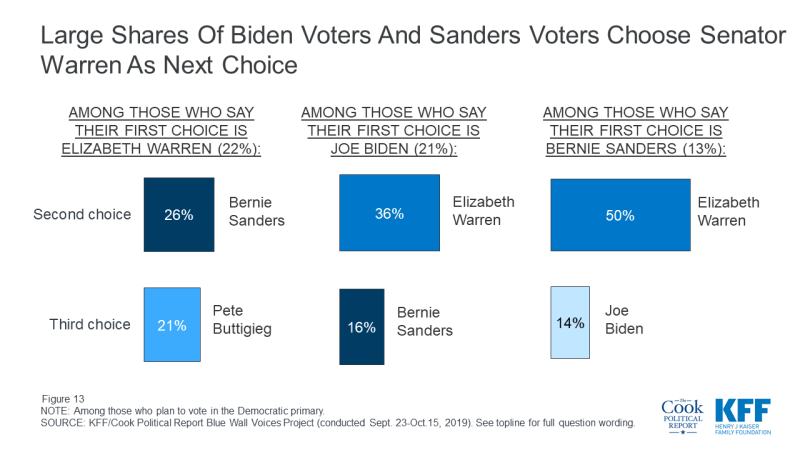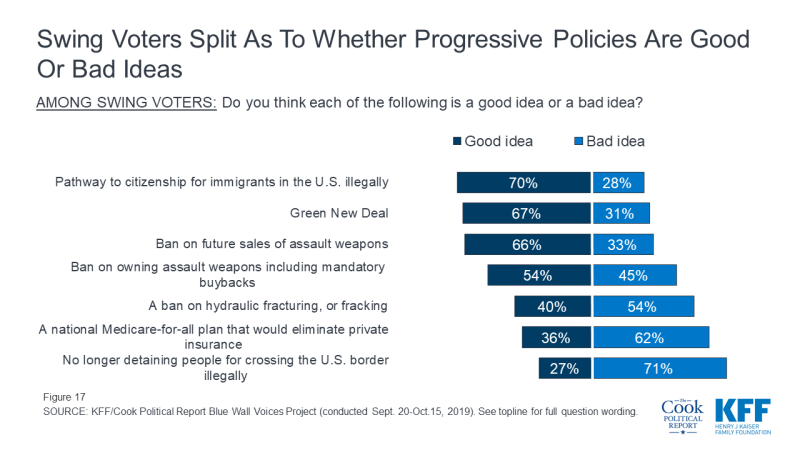Blue Wall Voices Project
Democratic Voters and the 2020 Democratic Primary
Democratic voters in the Blue Wall are divided in what is most important to them when selecting a candidate for president. Four in ten voters (42%) say it is more important that the Democrats select a candidate who “has the best chance to defeat President Trump” while a similar share (40%) say it is more important to select a candidate who “comes closest to their views on the issues.” Fewer (13%) voters say it is more important to select a candidate who “is the most authentic” and even fewer (4%) say it is most important to select a candidate who “can most disrupt the current system.”
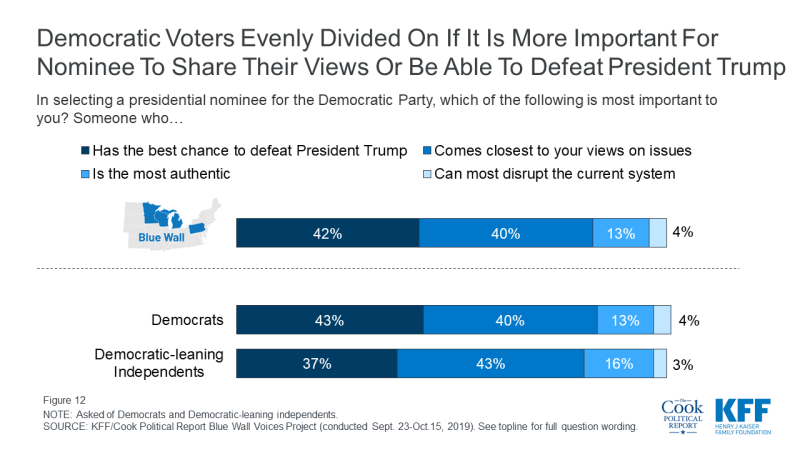
Figure 12: Democratic Voters Evenly Divided On If It Is More Important For Nominee To Share Their Views Or Be Able To Defeat President Trump
A larger share of Democratic and Democratic-leaning independent voters in Minnesota say it is more important that the eventual nominee be able to defeat President Trump (48%) than come closest to their views on the issues (33%).
| Table 2: Minnesota Democratic Voters Prioritize Defeating President Trump | |||||
| In selecting a presidential nominee for the Democratic Party, which of the following is most important to you? | Total | Michigan | Minnesota | Pennsylvania | Wisconsin |
| Has the best chance to defeat President Trump | 42% | 42% | 48% | 40% | 39% |
| Comes closest to your views on the issues | 40 | 45 | 33 | 38 | 42 |
| Is the most authentic | 13 | 11 | 16 | 13 | 17 |
| Can most disrupt the current system | 4 | 2 | 3 | 7 | 2 |
| NOTE: Among Democratic and Democratic-leaning independents. | |||||
Yet, despite this, significant shares of Democratic voters in each of the states say they do not plan to vote in the Democratic primary in their state and instead plan to wait to vote until the 2020 general election. One-third of Democratic and Democratic-leaning voters in Minnesota say they plan to wait to vote until the 2020 general election as do one-fourth of Democratic voters in Michigan, one-fifth of Democratic voters in Wisconsin, and 17% of Democratic voters in Pennsylvania.
Senator Warren and Vice President Biden Top List Of Democratic Primary Candidates
Among those primary election voters, Senator Elizabeth Warren and former Vice President Joe Biden have the edge over the other major Democratic presidential candidates. One-fifth of Democratic primary voters say Sen. Warren (22%) is the candidate they plan to support which is similar to the share who say Vice President Biden is the candidate they plan to support (21%). While Senator Warren and Vice President Biden garner similar shares of top choice votes among Democratic primary voters across the Blue Wall, four in ten Democratic primary voters choose Sen. Warren as either their first or second choice in the Democratic primary. This is followed by 29% who choose Vice President Biden, one-fourth who choose Sen. Sanders, and 14% who choose Mayor Pete Buttigieg. Most of the shift over to Sen. Warren is from Sen. Sanders supporters with half of Sen. Sanders supporters choosing Sen. Warren as their second choice of candidates. For more information about how voters in each of the states rank the candidates, check out the individual state reports.
The 2020 Democratic candidates are garnering support from slightly different voting groups throughout Michigan, Minnesota, Pennsylvania, and Wisconsin. Across the four states, a larger share of voters who chose Senator Sanders as their first choice are men (50%) compared to those who chose Senator Warren (35%) or Vice President Biden (43%) as their first choice candidate. Sen. Sanders also has an edge among younger voters with eight in ten of his supporters under the age of 50. Sen. Warren’s supporters, on the other hand, are more likely to be women (65%), and have at least a college degree (65%) compared to less than half of Sen. Sanders’ supporters or Vice President Biden’s supporters. About one in five of Vice President Biden’s supporters are African-American compared to smaller shares of Sanders’ supporters (9%) or Warren’s (7%).
Are Progressive Platforms Deal Breakers For Voters?
The Blue Wall Voices Project also seeks to find out how voters view many of the progressive positions being discussed by some of the Democratic nominees for president. Overall, a majority of voters in the Blue Wall who say they are either “definitely” or “probably” going to vote for the Democratic nominee view the progressive platforms asked about in this survey as “good ideas.” This includes majorities of these self-reported likely 2020 Democratic voters in each of the four states.
Nine in ten self-reported 2020 Democratic voters (92%) say the Green New Deal, the plan to address climate change through new regulations and increases in government spending on green jobs and energy-efficient infrastructure is a “good idea.” This is closely followed by large majorities who say a pathway to citizenship for immigrants in the U.S. illegally (91%), a ban on the future sale of assault weapons (88%), and a ban on the ownership of assault weapons and military-style rifles like the AR-15 including a mandatory buyback program for current owners (83%) are “good ideas.” Fewer, but still a majority (62%), say a national health plan in which all Americans would get their health coverage through a single government plan, Medicare-for-all, is a “good idea.” Slightly more than half of self-reported 2020 Democratic voters say stopping U.S. detainments for people crossing the border illegally or a ban on fracking are “good ideas” (56% and 54%, respectively). These three issues rank at the bottom of progressive platforms for self-reported 2020 Democratic voters in each of the four states.
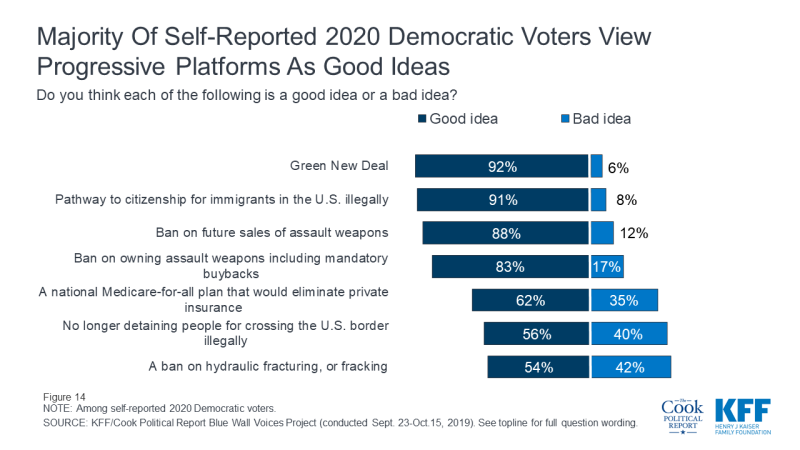
Figure 14: Majority Of Self-Reported 2020 Democratic Voters View Progressive Platforms As Good Ideas
Yet, none of these issues are “deal breakers” with small shares of voters saying there is no chance they would vote for a candidate who disagreed with them on the issue. The positions that solicit that largest share of voters saying there is “no chance” they would vote for them are if a candidate was against a ban on future sales of assault weapons (20%), against a ban on ownership of assault weapons (15%), or against the Green New Deal (13%).
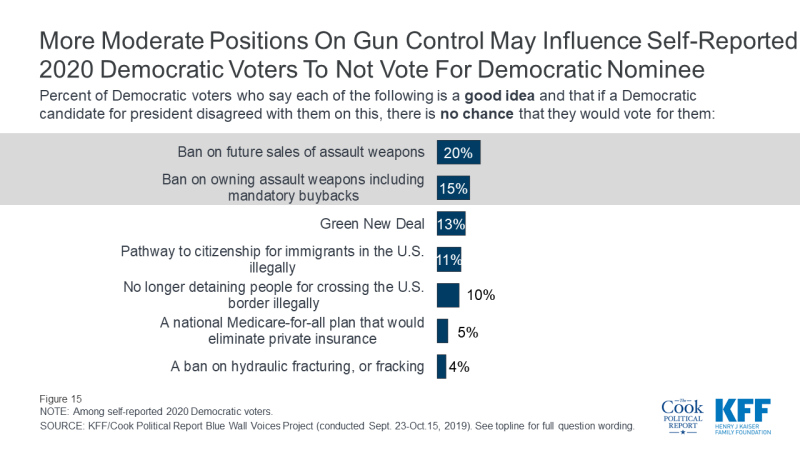
Figure 15: More Moderate Positions On Gun Control May Influence Self-Reported 2020 Democratic Voters To Not Vote For Democratic Nominee
Few self-reported 2020 Democratic voters view any of the progressive ideas as deal breakers with less than 10% of Democratic voters saying the platforms are “bad ideas” and if a Democratic candidate disagreed with them on this, there is no chance they would vote for them.
Some 2020 Democratic voters see Conservative gun Control Stance As A Possible Deal breaker
Many likely 2020 Democratic voters see more moderate positions on assault weapon bans as possible deal breakers. One-fifth of self-reported 2020 Democratic voters say there is “no chance” they would vote for a candidate who was against a ban on the future sales of assault weapons and about one in eight (15%) 2020 Democratic voters say there is “no chance” they would vote for a Democratic nominee who was against a ban on owning assault weapons, including a mandatory buyback program.
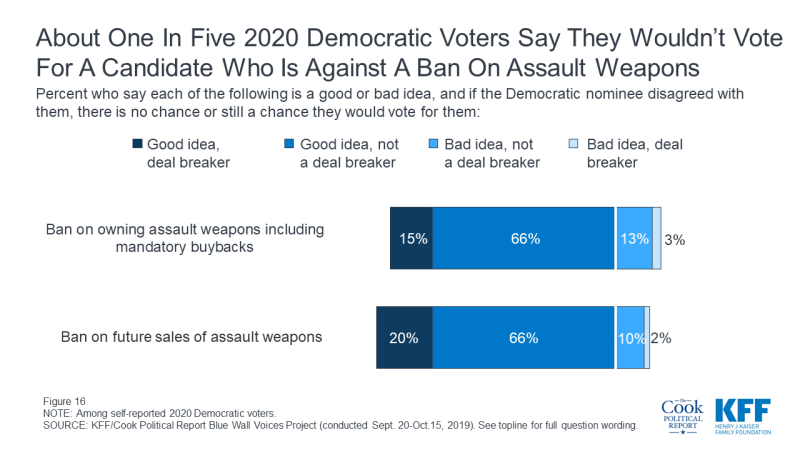
Figure 16: About One In Five 2020 Democratic Voters Say They Wouldn’t Vote For A Candidate Who Is Against A Ban On Assault Weapons
Swing Voters And Progressive Platforms
Majorities of swing voters, a crucial voting block in 2020, view a pathway to citizenship for immigrants in this country illegally (70%), the Green New Deal (67%), a ban on the future sale of assault weapons (66%), and a ban on the ownership of assault weapons including a mandatory buyback program (54%) as good ideas. Yet, many of these voters see three progressive platforms as “bad ideas.” Majorities of these voters view a ban on fracking (54%), a national Medicare-for-all plan (62%), and stopping border detainments of people coming into the country illegally (71%) as bad ideas.

